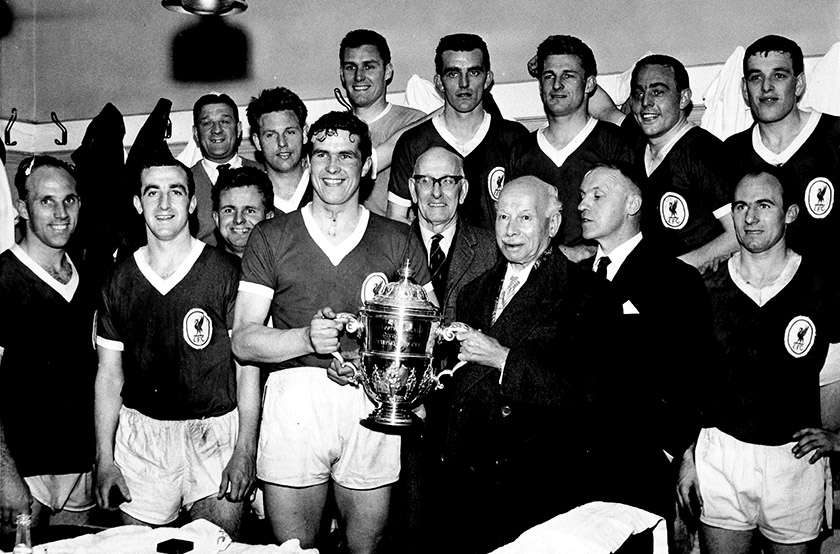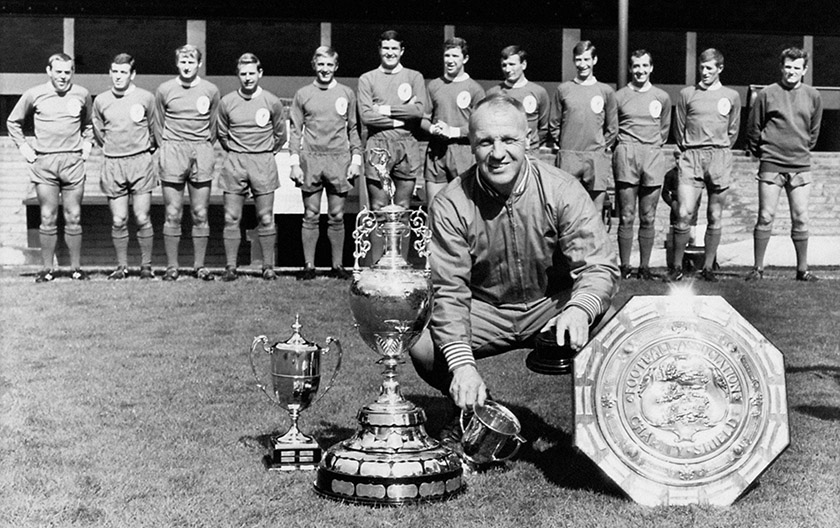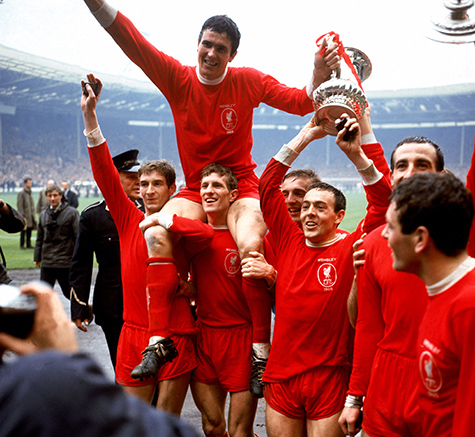colossus
Big Ron Yeats
Just for a moment, put yourself in the position of Ron Yeats. It's 1965, you're the captain of Liverpool Football Club and after 120 gruelling minutes you've just led the Reds to a first FA Cup triumph in the Club's 63-year history, beating Leeds United FC 2-1 at Wembley.
Now, after leading your team-mates up the famous Wembley steps, you're about to collect English football's most famous trophy from Her Majesty The Queen and hold it aloft, but first she asks you a question. “You must be exhausted?” says Queen Elizabeth II. How do you reply?
A couple of days before the FA Cup final, in a phone call from Buckingham Palace, Yeats had been briefed not to speak to the Queen until she addressed him, if he was the victorious skipper. The 27-year-old central defender was also told to only respond with “Yes, Ma'am,” and “No, Ma'am,” depending on what he was asked.
But in the heat of the moment, after wiping his hands on his Liverpool FC kit to ensure they were clean and dry (the FA Cup final had been played in pouring rain) as he walked towards the Royal Box, the well rehearsed protocol went out of Big Ron's head. “I'm absolutely knackered,” was his reply.

“I'm certain that you are,” responded Her Majesty The Queen, who was herself dressed in red, before handing Yeats the FA Cup. He lifted it up high – and when you stand at 6ft 2in tall you can lift it higher than most – and finally the red-half of Liverpool could rejoice.
Supporters of Everton FC, FA Cup winners in 1906 and 1933, had teased Kopites for years about the Reds failure to win the trophy, so seeing Yeats get his hands on it meant a lot. “It was an emotional time getting the cup from the Queen,” he later recalled. “In fact, I just wanted to throw it into the crowd, to the Liverpool supporters. We've won it now. Let's share it between us.”
Born in Aberdeen, Scotland in 1937, Ron Yeats was as important to Bill Shankly as Virgil van Dijk is to Jürgen Klopp now. Liverpool FC had been in the Second Division for seven seasons by the summer of 1961 and even Shankly, appointed as manager in 1959, knew he couldn't lead the Reds to promotion without rebuilding the spine of his team.
With increased transfer funds made available to him from the Liverpool FC board that summer, Shankly signed robust forward Ian St John from Motherwell FC and then set about trying to buy towering centre-half Yeats from Dundee United FC. Yeats was only a part-time player with the Scottish Second Division club as he was also in the Army, serving with the R.A.S.C.

Negotiations were protracted and during them Shankly met the 23-year-old in an Edinburgh hotel. “You must be seven feet tall, son?” said the Liverpool FC boss. “No, I'm only six feet tall,” replied Yeats. “Well, that’s near enough seven feet for me,” responded Shankly before telling his fellow Scot that Liverpool FC will soon be back in the First Division if he signed for the club.
Finally, on 22nd July 1961, Shankly got his man, a player who would be the cornerstone of his revolution, although Yeats couldn't join up with his new team-mates until 16th August – three days before the season started – when he was officially 'demobbed' from the Army in Yeovil. Shankly sent Tom Bush, a former Liverpool FC player who worked with the youth players and as an Anfield administrator at the time, down to Somerset to collect him upon his release.
The Liverpool FC manager then invited the press to take a walk around his new 'colossus,' later declaring: “With him in defence we could play Arthur Askey [an English comedian] in goal!” Yeats was also given two nicknames. He was known as 'Big Ron/Big Ronnie', to distinguish him from team-mate Ronnie Moran, but was also called 'Rowdy' by Liverpool FC supporters after the character Rowdy Yates, played by Clint Eastwood in the TV series Rawhide.
Liverpool FC won 10 and drew one of their opening 11 Second Division games in 1961/62 and led the table from start to finish. Halfway through the campaign, Yeats was appointed as the Club's new captain, replacing Dick White. His first game with the armband, on Boxing Day 1961, ended in a 1-0 defeat to Rotherham United FC at Millmoor, but four months later he was skippering the Reds to a 2-0 Anfield win against Southampton FC, securing promotion back to the top-flight. There was even better to come.

In 1963/64, the Reds' second season back in Division One, Yeats captained Liverpool FC to a first league championship success since 1947. It was the Club's sixth league title, putting the Reds level again with Everton FC, and during the campaign Yeats scored his first of 16 Liverpool FC goals, heading home the winner in a 1-0 victory against Manchester United FC at Old Trafford.
That title success meant the Redmen had qualified for European competition for the first time. So in August 1964, Yeats became the first Liverpool FC player to captain the team in Europe as the Reds beat Knattspyrnufélag Reykjavíkur 5-0 in Iceland in the European Cup preliminary round. Three months later, it was Yeats that Shankly used as a model to introduce Liverpool FC's now famous all-red strip.
Drawn against Belgian champions Royal Sporting Club Anderlecht in the first round of the European Cup, Shankly felt he needed to give his side a psychological advantage against their more experienced opponents. He had always thought CF Real Madrid looked smart – almost regal – in all-white, so after an Anfield training session asked Yeats to put on a pair of red shorts with his red Liverpool FC shirt.
“I had to run down the tunnel, up the stairs and then out,” recalled Big Ron. Shankly's eyes lit up. “Jesus Christ, son, you look about eight feet tall in that,” he declared. “You'll scare the living daylights out of them.” Yeats suggested he should wear red socks as well – Liverpool FC had traditionally played in white shorts and socks – and that is how the Reds became red all over.

Liverpool FC still wore white socks in the first leg against Royal Sporting Club Anderlecht at Anfield, presumably as the Club couldn't acquire enough sets of red socks at such short notice, but won 3-0 with Yeats on the scoresheet. Initially, LFC wore all-red only in Europe, beating the Belgians 1-0 in Brussels dressed fully in red for the first time, but Shankly also introduced it for FA Cup games in early 1965, starting with a fourth round replay win at Stockport County FC.
It was in that all-red kit that Yeats received the FA Cup from the Queen and 12 months later he was lifting another First Division championship trophy as Liverpool FC won the league again in 1965/66. They also reached the (now defunct) UEFA European Cup Winners' Cup final against Borussia Dortmund at Hampden Park in Glasgow, but a freak Yeats own goal in extra-time, after a shot hit the crossbar and went into the net off him, meant he never got to lift a European trophy as LFC captain.
By 1970/71, Yeats' best days were behind him and after making his 454th and final appearance in April 1971, ironically against Leeds United FC, he moved on to Tranmere Rovers FC at the end of the year to become player-manager. He later had playing spells in America and non-league football, appearing 15 times for Formby FC in 1977/78 at the age of 40.

In 1986, following a period outside the game, Yeats returned to Anfield when player-manager Kenny Dalglish appointed him as chief scout. He spent 20 years in the job, retiring in May 2006, and famously recommended Sami Hyypia to Liverpool FC boss Gerard Houllier in 1999 when he was also searching for a towering centre-half. Takes one to know one, you might say.
Now aged 82, Yeats sadly suffers from Alzheimer's Disease, but remains proud of his achievements. He captained the Reds in 416 games – only Steven Gerrard (473) has worn the armband more – and in 2009 spoke of his biggest accomplishments at Liverpool FC.
“There have been two of them. Being the captain that took the club out of the Second Division after eight years was a very, very proud moment. We won the league by eight or nine points that season and to follow that by being the first captain of Liverpool to lift the FA Cup is something I am very proud of. I do not go round with the medals on my chest, it is just there for me to say.”